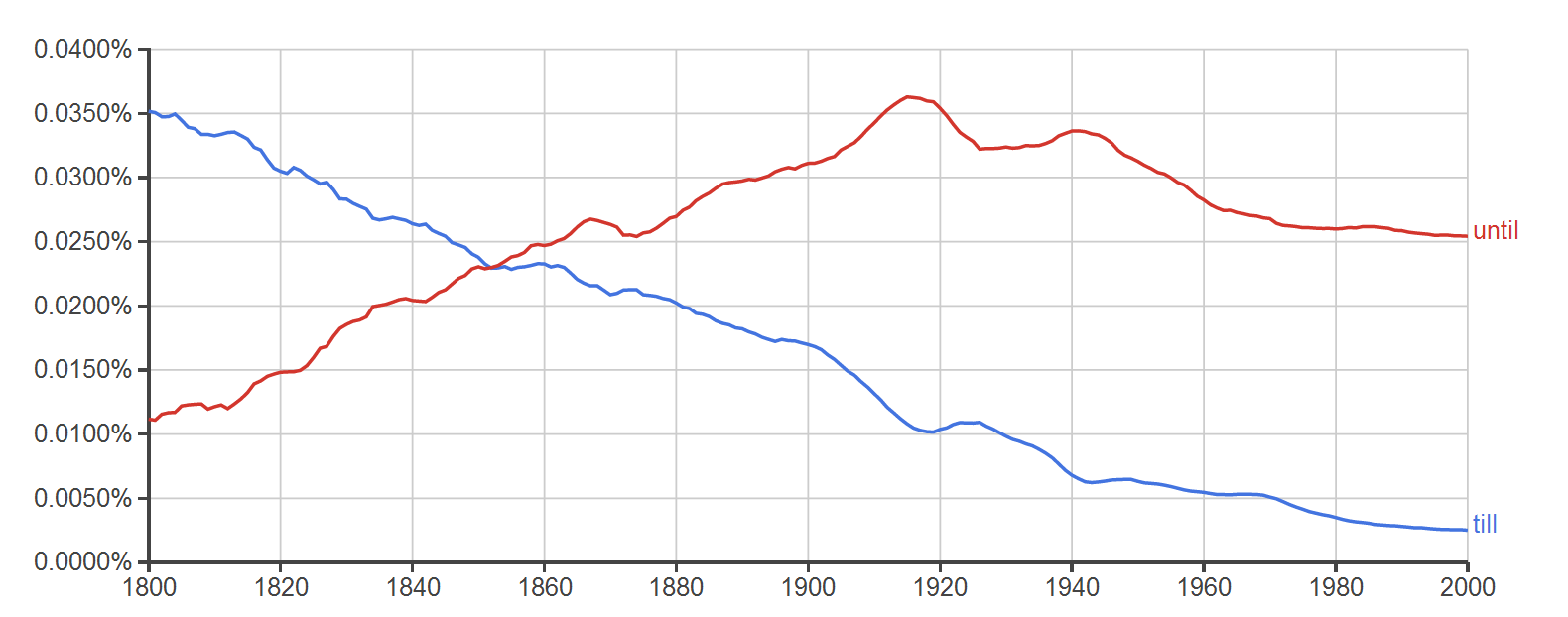Is there "not...till"? Does its meaning equal to "not...until"? Does the sentence "A body at rest will not move till a force is exerted on it" sound natural?
-
2I think you will find "till" only in informal speech and litarary works. There is no difference in meaning and whether it sounds natural depends on the context and situation. Any specific reason for not using "until"?– user3169Commented Aug 2, 2014 at 16:50
-
1Same question in EL&U: english.stackexchange.com/questions/6989/…– jinaweeCommented Aug 3, 2014 at 0:13
-
@jinawee I visited the link you posted. There it says when negative sentences are concerned, using "till" is not correct. And hence the sentence in OP is not correct. Am I right?– Man_From_IndiaCommented Sep 2, 2014 at 2:57
-
@Man_From_India I'm not a native but I'll give my view. As you can see in the comments there, some people find more natural using "till" in particular negative conditionals (I'd prefer "till" rather than "until" in "I'm not gonna say a word till I get a lawyer" for the sake of fludity) . So you can't say whether is correct or not, it will just sound different. In the OP's case, "until" might fit better, but "till" is fine (if it were in a high school texbook, "till" would possibly seem strange).– jinaweeCommented Sep 2, 2014 at 8:18
Add a comment
|
1 Answer
The word till is a synonym of until, so the meaning is the same, yes. Until is the more standard word.
It can also be written 'til or til. (Both are less formal than until)
Edit: Note that until is the preferred word today, so until will usually sound most natural. Other meanings of till are even included in this graph:

-
4The 'til spelling represents a misconception that the word is abbreviated from until, when in fact it is the older, more basic word. I suggest using the standard spelling till instead.– user230Commented Aug 2, 2014 at 23:07
-
1Or just use until, as it is far more popular word today, used over 90% of the time (according to an ngram query)– QubeiCommented Aug 3, 2014 at 1:03
-
@snailplane Do you have a source for that? I always assumed 'til came from until, and I use
'tilexclusively (and even scoff attillusers).– paboCommented Aug 9, 2014 at 0:45 -
2@pabo Sure, pretty much any source you like. EtymOnline is one that's freely available. The Oxford English Dictionary says: "ME. (originally northern) untill, f. ON. und (retained only in unz, undz = und es), = Goth. und (and untē), OS. und (usually unt), OFris. und (ont), up to, as far as + till (till prep. and conj).]". You can, of course, scoff for whatever reason you like, but scoffing at someone for preferring the standard spelling of a word is a rather strange choice.– user230Commented Aug 9, 2014 at 0:54
-
1The AHD suggests that 'til is now acceptable as an alternative respelling of till: "Till is actually the older word, with until having been formed by the addition to it of the prefix un-, meaning "up to." In the 18th century the spelling 'till became fashionable, as if till were a shortened form of until. Although 'till is now nonstandard, 'til is sometimes used in this way and is considered acceptable, though it is etymologically incorrect." Of course, till is still standard and in widespread use.– user230Commented Aug 9, 2014 at 1:04
